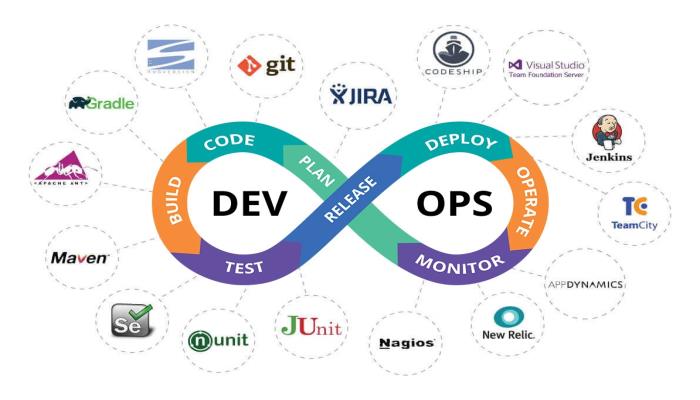What is the DevOps lifecycle? How does DevOps work?

DevOps has emerged as a transformative force in software development and IT operations in today’s rapidly evolving technological landscape. The DevOps lifecycle represents a complete approach to software delivery, combining development (Dev) and operations (Ops) teams to streamline processes, enhance collaboration, and accelerate innovation. But what exactly is the DevOps lifecycle, and how does it function within organizations? Let’s delve into DevOps’s core principles, stages, and workings to uncover its profound impact on modern software delivery practices.
The popularity of DevOps continues to soar as organizations recognize its ability to drive efficiency, improve collaboration, and accelerate software delivery. With businesses across industries embracing DevOps practices, demand for skilled professionals is surging. Pursuing a DevOps course equips individuals with essential skills such as automation, continuous integration/continuous deployment (CI/CD), and infrastructure as code (IaC), making them highly valuable assets in the competitive job market. By staying ahead of the curve with DevOps training, individuals are indispensable contributors to organizational success, ensuring relevance and competitiveness in today’s dynamic tech industry.
Definition of the DevOps lifecycle
The DevOps lifecycle refers to the iterative process of software development and delivery, integrating development (Dev) and operations (Ops) teams to achieve seamless collaboration and automation. It encompasses various stages, including continuous development, integration, testing, deployment, and monitoring. Each stage fosters agility, efficiency, and quality throughout the software delivery pipeline. The lifecycle emphasizes cultural shifts, automation, and collaboration, enabling teams to iterate, deploy, and improve software products rapidly. Overall, it represents a holistic approach to software delivery that prioritizes collaboration, automation, and continuous improvement to meet the demands of modern technology-driven environments.
Core principles guiding the DevOps approach
The DevOps approach’s core principles revolve around collaboration, automation, and continuous feedback. Collaboration fosters communication and teamwork between development and operations teams, breaking down silos to promoting shared responsibility. Automation streamlines processes, reducing manual errors and enhancing efficiency. Continuous feedback loops enable teams to iterate and improve continuously, driving innovation and responsiveness. These principles underpin the DevOps culture, emphasizing agility, quality, and customer-centricity to meet the demands of today’s fast-paced software development and deployment environments.
Core principles guiding the DevOps approach
The DevOps approach is guided by core principles focused on collaboration, automation, and continuous improvement. Collaboration encourages cross-functional teams to work together seamlessly, fostering communication and shared responsibility. Automation eliminates manual tasks, streamlining processes and reducing errors, enabling faster and more reliable deployments. Continuous improvement emphasizes iterative development cycles and feedback loops, ensuring that teams can adapt and evolve their practices to meet changing requirements and deliver high-quality software efficiently in today’s dynamic environments.
Stages of the DevOps lifecycle
The DevOps lifecycle comprises five key stages, each essential for achieving seamless software delivery:
Continuous Development: In this initial stage, developers continuously write, modify, and enhance code to meet evolving requirements. Version control systems like Git facilitate collaboration, allowing teams to manage changes efficiently. Continuous Development emphasizes agile methodologies, enabling rapid iteration and feedback incorporation.
Continuous Integration: Continuous Integration (CI) involves integrating code changes into a shared repository multiple times a day. Automated build and test processes ensure that new code integrates smoothly with the existing codebase, reducing integration issues and enabling early detection of defects.
Continuous Testing: Continuous Testing ensures the quality and reliability of code changes throughout the development process. Automated testing frameworks execute various types of tests, including unit, integration, and regression tests, continuously providing feedback on code quality. This stage helps catch bugs early, ensuring that only high-quality code progresses further in the pipeline.
Continuous Deployment: Continuous Deployment automates the process of deploying code changes into production environments. Automated deployment pipelines streamline the release process, ensuring that code changes are deployed swiftly and reliably while minimizing downtime and manual intervention. Continuous Deployment enables organizations to deliver features and updates to end-users rapidly and frequently.
Continuous Monitoring: Continuous Monitoring involves monitoring applications and infrastructure in real-time to detect and address performance issues, errors, and anomalies. Monitoring tools collect and analyze metrics, logs, and events, providing insights into system health and performance. Automated alerts notify teams of issues, enabling proactive troubleshooting and rapid resolution to maintain system reliability and performance.
Together, these stages form an interconnected and iterative lifecycle that enables organizations to achieve faster time-to-market, higher quality, and improved collaboration, ultimately supporting the delivery of value to end-users efficiently and effectively.
How DevOps Works?
Collaboration between development and operations teams lies at the heart of DevOps practices. Traditionally siloed, these teams now work closely together, breaking down barriers to communication and fostering shared accountability. Collaboration entails joint decision-making, with developers understanding operational requirements and operations staff participating in the development process. This alignment ensures that software is not only developed efficiently but also operates effectively in production environments.
Automation and tooling form the backbone of DevOps practices, enabling teams to streamline processes and increase efficiency. Automation reduces manual intervention, minimizing errors and accelerating deployment cycles. Tools such as configuration management systems, continuous integration/continuous deployment (CI/CD) pipelines, and infrastructure as code (IaC) facilitate automated provisioning, testing, and deployment of software and infrastructure components. Automation empowers teams to focus on innovation and value delivery rather than repetitive tasks.
Emphasis on culture and communication is crucial in DevOps implementations. Cultivating a culture of collaboration, trust, and continuous improvement fosters a conducive environment for DevOps practices to thrive. Effective communication channels ensure that teams share knowledge, feedback, and insights transparently, promoting a sense of ownership and accountability. This cultural shift encourages experimentation, learning from failures, and adapting to change, essential elements of a successful DevOps culture.
Implementing DevOps methodologies yields numerous benefits. Firstly, organizations experience faster time to market, enabling them to respond swiftly to market demands and gain a competitive edge. Secondly, DevOps practices result in improved software quality, with automated testing and deployment processes reducing defects and enhancing reliability. Lastly, DevOps enhances team productivity and morale by streamlining workflows, fostering collaboration, and empowering teams to deliver value efficiently, ultimately leading to higher job satisfaction and engagement. Overall, embracing DevOps methodologies drives organizational success by optimizing processes, fostering innovation, and delivering superior products and services to customers.
Conclusion
Understanding the DevOps lifecycle and its workings is paramount in today’s technology-driven landscape. DevOps fosters collaboration, automation, and a culture of continuous improvement, enabling organizations to deliver software efficiently and reliably. Embracing DevOps methodologies not only accelerates time to market and enhances software quality but also boosts team productivity and morale. Pursuing a DevOps course equips professionals with the skills and knowledge needed to navigate complex technological ecosystems, making them invaluable assets in an increasingly competitive job market. By staying abreast of rapid advancements through DevOps training, individuals position themselves as in-demand experts capable of driving innovation and success in the constantly evolving tech industry.



